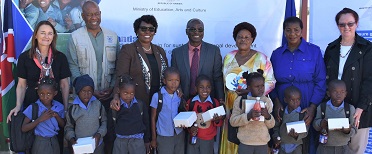
EU launches N$ 320 million programme for local early childhood development

The Ambassador of the European Union (EU) Delegation to Namibia, Ana-Beatriz Martins on Wednesday unveiled a new initiative aimed at revolutionizing early childhood education, at the Harmony Early Childhood Development (ECD) Centre in the Mix Settlement.
The “EU-Namibia Early Childhood Development Sector Reform Launch” marks the beginning of a transformative journey to enhance access to quality education for Namibian children.
Addressing a distinguished audience, including government officials, community representatives, educators, and media personnel, Martins emphasized the significance of the partnership between the EU and Namibia in the field of education.
She highlighted the long-standing commitment of the EU to education in Namibia, spanning over 15 years, with tangible outcomes evident at institutions like the Harmony ECD Centre.
The launch event heralded the commencement of a new EU Sector Budget support programme in Early Childhood Education, backed by a substantial budget of approximately NAD 320 million. Ambassador Martins underscored the program’s overarching objectives, which include expanding access to pre-primary education facilities, increasing the number of pre-primary classes nationwide, and enhancing the quality of care and teaching for young children.
Furthermore, the Ambassador announced the renewal of the EU’s partnership with UNICEF and the World Food Programme (WFP) to provide technical assistance to the Ministries of Gender Equality, Poverty Eradication and Social Welfare, and Education Arts and Culture. This collaboration aims to strengthen institutional capacities and bolster policy frameworks to support the effective implementation of the ECD programme.
Highlighting the government’s commitment to child welfare and education, Ambassador Martins praised Namibia’s efforts in ratifying international conventions and allocating approximately 20% of its public budget to the education sector. She emphasized the pivotal role of early childhood development in laying the foundation for lifelong learning and academic success, stressing the importance of inclusivity and equity in reaching vulnerable children.
The EU’s initiative comes at a critical juncture, with less than 25% of Namibian children aged 3 to 4 having access to ECD and pre-primary education. The programme seeks to address this disparity by prioritizing children from disadvantaged households, ensuring equal opportunities for all to thrive and reach their full potential.
Martins reiterated the necessity of strong partnerships at all levels, involving government, civil society organizations, development partners, and communities, to overcome the challenges facing the education sector. She emphasized the EU’s unwavering commitment to supporting quality education in Namibia, as reflected in the allocation of 12% of its cooperation budget to the education sector.
In closing, Martins expressed optimism about the transformative impact of the EU-Namibia Early Childhood Development Sector Reform Launch, envisioning a brighter future for children. She commended the dedication of all stakeholders involved and encouraged continued collaboration to ensure the success of the programme in shaping the destiny of youth.
 Ambassador H.E. Ana Beatriz Martins, WFP Country Director Dr George Fedha, Minister of Education Hon. Ana Nghipondoka, Minister of Gender Hon Doreen Sioka, ED of Gender Min Ms Martha Mbombo and Deputy ED of Education Ministry Ms Edda Bohn flanked by children from Mix Primary School.
Ambassador H.E. Ana Beatriz Martins, WFP Country Director Dr George Fedha, Minister of Education Hon. Ana Nghipondoka, Minister of Gender Hon Doreen Sioka, ED of Gender Min Ms Martha Mbombo and Deputy ED of Education Ministry Ms Edda Bohn flanked by children from Mix Primary School.











































